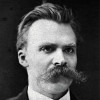“ Vanity is one of the things which are perhaps most difficult for a noble man to understand: he will be tempted to deny it, where another kind of man thinks he sees it self-evidently. ”
Friedrich Nietzsche, Beyond Good and Evil (1886). copy citation
| Author | Friedrich Nietzsche |
|---|---|
| Source | Beyond Good and Evil |
| Topic | vanity understanding |
| Date | 1886 |
| Language | English |
| Reference | |
| Note | Translated by Helen Zimmern |
| Weblink | http://www.gutenberg.org/files/4363/4363-h/4363-h.htm |
Context
“the desire for FREEDOM, the instinct for happiness and the refinements of the feeling of liberty belong as necessarily to slave-morals and morality, as artifice and enthusiasm in reverence and devotion are the regular symptoms of an aristocratic mode of thinking and estimating.—Hence we can understand without further detail why love AS A PASSION—it is our European specialty—must absolutely be of noble origin; as is well known, its invention is due to the Provencal poet-cavaliers, those brilliant, ingenious men of the "gai saber," to whom Europe owes so much, and almost owes itself.
261. Vanity is one of the things which are perhaps most difficult for a noble man to understand: he will be tempted to deny it, where another kind of man thinks he sees it self-evidently. The problem for him is to represent to his mind beings who seek to arouse a good opinion of themselves which they themselves do not possess—and consequently also do not "deserve,"—and who yet BELIEVE in this good opinion afterwards.”
source



